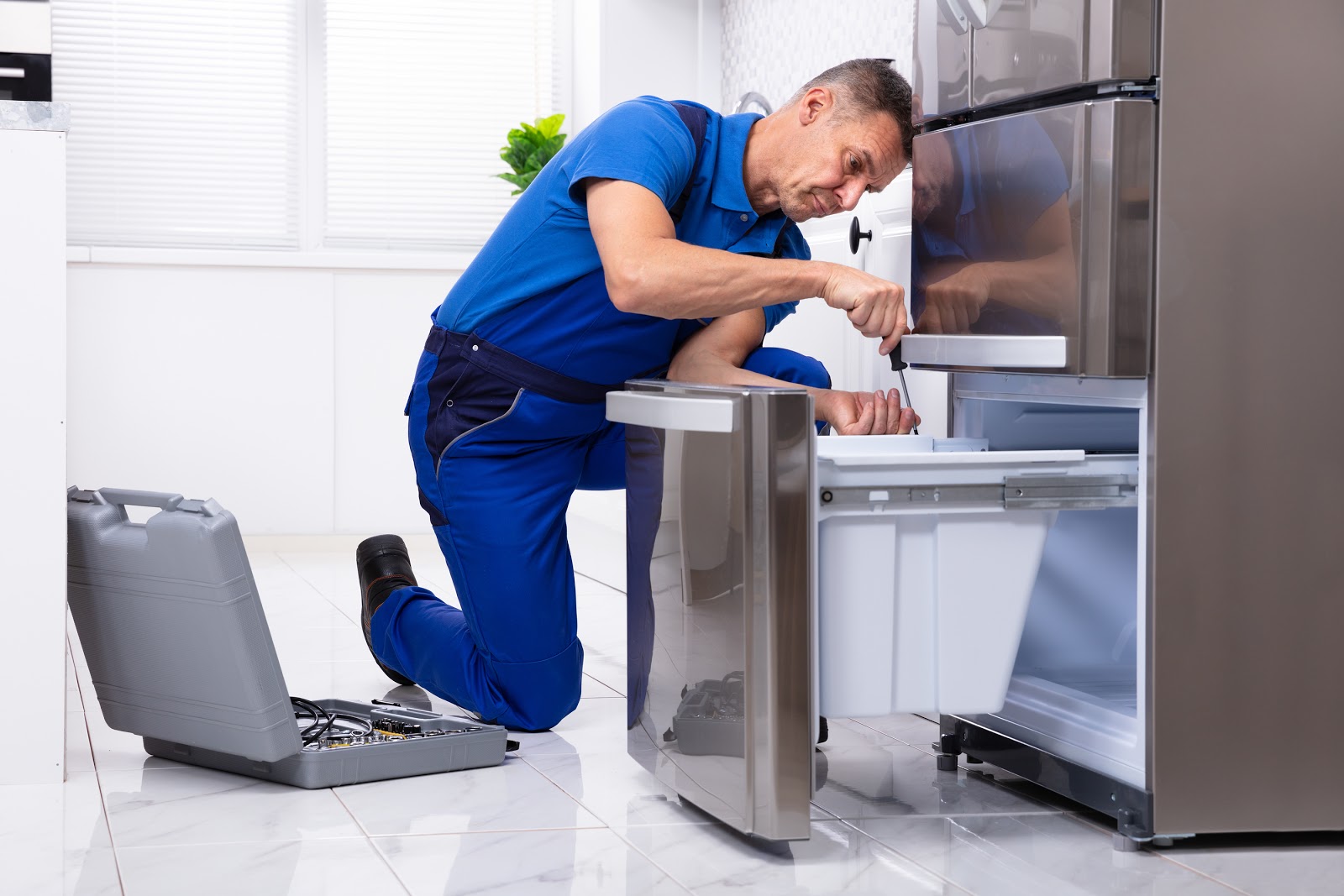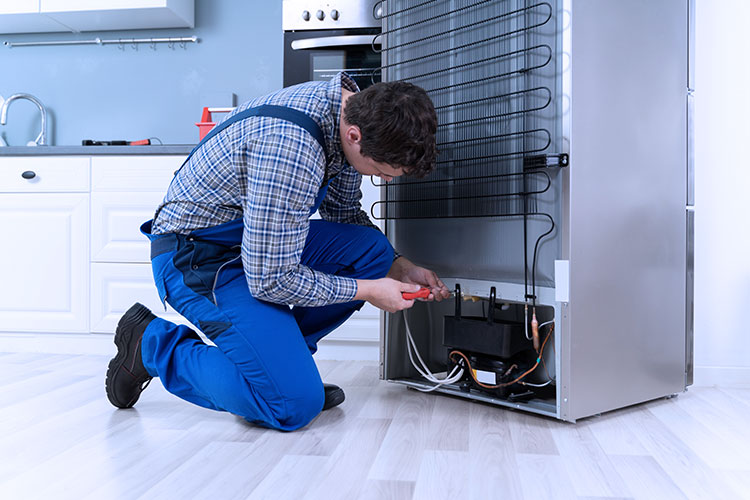Dependable Refrigeration & Appliance Repair Service LG Appliance Repair Guide: How to Detect Common LG Appliance Problems Early
Vital Tips for Effective Ref Repair to Prolong Appliance Life Expectancy
When it comes to your fridge, correct fixing and maintenance are important for durability. Recognizing typical issues and recognizing when to act can make all the distinction.
Comprehending Usual Refrigerator Troubles
Refrigerators are necessary in keeping your food fresh, yet they can encounter a range of typical troubles that interrupt their performance. If you observe food ruining quicker than usual, check the thermostat setups or consider if the door seals are harmed. Acknowledging these concerns early can conserve you time and money in fixings, ensuring your fridge runs smoothly and effectively.
Regular Maintenance Practices
To maintain your devices running efficiently, you need to remain on top of normal upkeep practices. Clean the condenser coils, check the door seals, and keep an eye on the temperature level setups to guarantee peak efficiency. These simple tasks can save you time and money on fixings down the line.
Clean Condenser Coils Routinely
Cleaning your condenser coils on a regular basis can substantially improve your home appliance's efficiency. Dust and dirt develop up on these coils over time, causing your home appliance to function more challenging and eat even more power. To keep them clean, unplug your home appliance and very carefully remove any type of safety covers.
Examine Door Seals
Three simple steps can help you guarantee your home appliance's door seals are in great condition. Second, clean the seals using warm, soapy water to eliminate any type of particles or crud. By adhering to these actions, you'll keep your device's performance and long life, conserving you money on power costs and repairs in the long run.
Monitor Temperature Level Settings
Frequently monitoring your appliance's temperature level setups is necessary for ideal efficiency and efficiency. Whether you're taking care of a refrigerator, freezer, or oven, watching on these setups can avoid lots of issues. For fridges, aim for temperatures in between 35 ° F and 38 ° F; for fridges freezer, stick around 0 ° F. If the temperatures are too expensive or low, your device might function harder, losing energy and reducing its lifespan. Use a thermometer to examine these settings regularly, specifically after significant modifications, like moving your home appliance or readjusting the thermostat. If you discover changes, adjust the setups as necessary and consult the user handbook for support. By remaining proactive about temperature level surveillance, you'll assure your home appliances run smoothly and last longer.
Fixing Cooling Issues
When your refrigerator isn't cooling down appropriately, it can lead to spoiled food and threw away cash, so resolving the concern immediately is crucial. Start by inspecting the temperature level setups to validate they're at the recommended degrees, generally around 37 ° F for the fridge and 0 ° F for the freezer. If the setups are appropriate, examine the door seals for any voids or damages; a defective seal can allow cozy air to go into.
Inspect the condenser coils, typically located at the back or base of the unit. Clean them with a vacuum or brush to enhance efficiency. If issues persist, it may be time to call an expert.
Taking Care Of Water Leakage and Ice Accumulation
If you're handling water leak or ice build-up in your home appliance, it's vital to recognize the resource of the problem. By identifying where the water is originating from, you can protect against further concerns and avoid pricey repairs. Let's explore some efficient methods to tackle these common problems.
Recognize Leakage Sources
Just how can you successfully identify the sources of water leak and ice build-up in your home appliances? Start by evaluating the seals and gaskets on your refrigerator and freezer doors. A worn or broken seal can allow warm air to enter, causing condensation and ice. Next off, inspect the drainpipe pan and drainage system for blockages or clogs; a backed-up drain can lead to water pooling. Seek any type of loose connections in the supply of water line, which can develop leakages. Analyze the defrost drainpipe for ice buildup, which could interrupt proper drainage. By systematically examining these areas, you'll determine the source of the trouble, allowing you to take the necessary actions to repair it and expand your home appliance's life-span.
Prevent Ice Development
To avoid ice development in your home appliances, begin by confirming the temperature setups are appropriate. If your fridge or freezer is also chilly, it can cause extreme ice accumulation. Inspect the door seals on a regular basis; check this site out harmed seals can let cozy air in, creating condensation and ice formation.
Maintain the device well-ventilated and prevent congestion, as this can block air flow - Appliance Repair Oro Valley Dependable Appliance Services. Routinely defrost your fridge freezer if it does not have an automated defrost attribute.
If you notice water leakage, recognize and deal with any type of blocked drainage openings, as they can contribute to ice buildup. Finally, tidy the coils and verify they're functioning appropriately to preserve peak performance. Taking these steps will help prolong your home appliance's life-span and efficiency.
Attending To Noisy Refrigerator Appears
While it might seem disconcerting, a noisy fridge usually signifies small concerns rather than significant breakdowns. Recognize the resource of the noise. Common perpetrators consist of the compressor, followers, and water lines. If you listen to a buzzing noise, it could be the compressor functioning hard; this might just be a normal operation audio.
Next, inspect for loose products inside. Often, containers or racks can rattle, producing undesirable noise. Tighten or reorganize them to remove the sounds.
If you see a clicking noise, it could be the defrost timer. This is typically safe however can suggest it needs inspection.
Finally, confirm your refrigerator is level. An unbalanced appliance can produce vibrations and noise. Use a level to inspect, and readjust the feet if needed. Dealing with these problems immediately can aid keep your refrigerator's efficiency and extend its life-span.
When to Change Parts vs. Full Replacement

Think about the cost of fixings versus the appliance's worth. In addition, if you notice ongoing issues that maintain repeating, it's an indicator that your home appliance has reached the end of its life.
Understanding When to Call a Specialist
How can you tell when it's time to call in an expert for device repair work? If your appliance stops functioning entirely or frequently journeys circuit breakers, it's an additional red flag.
You ought to also consider your own comfort level with fixings. If you're unclear regarding identifying the problem or lack the right devices, browse around here it's ideal to connect for assistance. Bear in mind, attempting challenging fixings can lead to more damage or even safety and security dangers.

Frequently Asked Inquiries
Exactly how Commonly Should I Tidy the Refrigerator Coils?
You need to cleanse your refrigerator coils every six months. This assists preserve efficiency and prevents overheating. If you see extreme dirt or family pet hair, clean them extra often to ensure your refrigerator runs smoothly.

Can I Use Vinegar for Cleaning My Fridge?
Yes, you can utilize vinegar to cleanse your refrigerator! It's an outstanding natural cleaner that gets rid of smells and stains. GE appliance repair Oro Valley Dependable Refrigeration & Appliance Repair Service. Just blend it with water, apply it to surfaces, and wipe down for a fresh, clean refrigerator
What Temperature level Should My Refrigerator Be Set To?
You should set your refrigerator to 37 ° F(3 ° C) for optimal food conservation. This temperature level maintains your food fresh while avoiding putridity, guaranteeing your groceries last much longer and decreasing waste. It's a very easy modification you can make!
Does a Fridge Need to Be Leveled?
Yes, your fridge requires to be leveled. If it's irregular, it can impact cooling down performance and create excess sound. Check the progressing legs and change them to guarantee proper equilibrium for excellent efficiency.
Exactly How Can I Reduce Refrigerator Energy Intake?
To lower your refrigerator's energy usage, maintain it clean and well-ventilated, inspect door seals for leaks, established the temperature in between 35-38 ° F, and stay clear of straining it. These steps can considerably lower your energy costs.